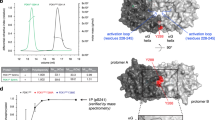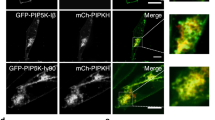Abstract
Several observations indicate that the Raf-1 kinase is a downstream effector of protein kinase C-ε (PKCε). We recently have shown that Raf-1 is constitutively activated in PKCε transformed Rat6 fibroblasts, and transformation can be reverted by expression of a dominant negative Raf-1, but not a dominant negative Ras mutant (Cacace et al., 1996). Cai et al. (1997) demonstrated that PKCε induced proliferation of NIH3T3 cells is independent of Ras or Src, but depends on Raf-1. These authors further suggested that PKCε activates Raf-1 by direct phosphorylation. Here we have investigated the functional interaction between PKCε and Raf-1. PKCε, but not PKCα, was found to bind to the Raf-1 kinase domain. The association appeared to be direct, as it could be reconstituted in vitro with purified proteins. Raf-1 and PKCε could be co-precipitated from Sf-9 insect cells and PKCε transformed NIH313 cells (NIH/ε). The association was negatively regulated by ATP in vitro and by TPA treatment in NIH/ε cells, but not in Sf-9 insect cells. Raf-1 was constitutively activated in NIH/ε cells. However, using coexpression experiments in Sf-9 cells and transiently transfected A293 cells we did not obtain any evidence for a direct activation of Raf-1 by PKCε. PKCε did not induce translocation of Raf-1 to the membrane. Furthermore, PKCε did not activate Raf-1 nor enhance the kinase activity of Raf-1 that had been pre-activated by coexpression of Ras or the Lck tyrosine kinase. In contrast, conditioned media from PKCε transformed cells induced a robust activation of Raf-1. This activation could be partially reproduced by recombinant TGFβ, a growth factors secreted by PKCε transformed Rat6 cells. In conclusion, our results suggest that PKCε stimulates Raf-1 indirectly by inducing the production of autocrine growth factors.
This is a preview of subscription content, access via your institution
Access options
Subscribe to this journal
Receive 50 print issues and online access
$259.00 per year
only $5.18 per issue
Buy this article
- Purchase on Springer Link
- Instant access to full article PDF
Prices may be subject to local taxes which are calculated during checkout
Similar content being viewed by others
Author information
Authors and Affiliations
Rights and permissions
About this article
Cite this article
Ueffing, M., Lovrić, J., Philipp, A. et al. Protein kinase C-ε associates with the Raf-1 kinase and induces the production of growth factors that stimulate Raf-1 activity. Oncogene 15, 2921–2927 (1997). https://doi.org/10.1038/sj.onc.1201477
Received:
Revised:
Accepted:
Issue Date:
DOI: https://doi.org/10.1038/sj.onc.1201477
Keywords
This article is cited by
-
TRPM2 promotes pancreatic cancer by PKC/MAPK pathway
Cell Death & Disease (2021)
-
Role of Protein Kinase C in TBT-Induced Inhibition of Lytic Function and MAPK Activation in Human Natural Killer Cells
Archives of Environmental Contamination and Toxicology (2010)
-
Integration of P2Y receptor-activated signal transduction pathways in G protein-dependent signalling networks
Purinergic Signalling (2006)
-
Intestinal Na+–K+–ATPase activity and molecular events downstream of interferon‐γ receptor stimulation
British Journal of Pharmacology (2004)
-
PKCη associates with cyclin E/cdk2/p21 complex, phosphorylates p21 and inhibits cdk2 kinase in keratinocytes
Oncogene (2000)



